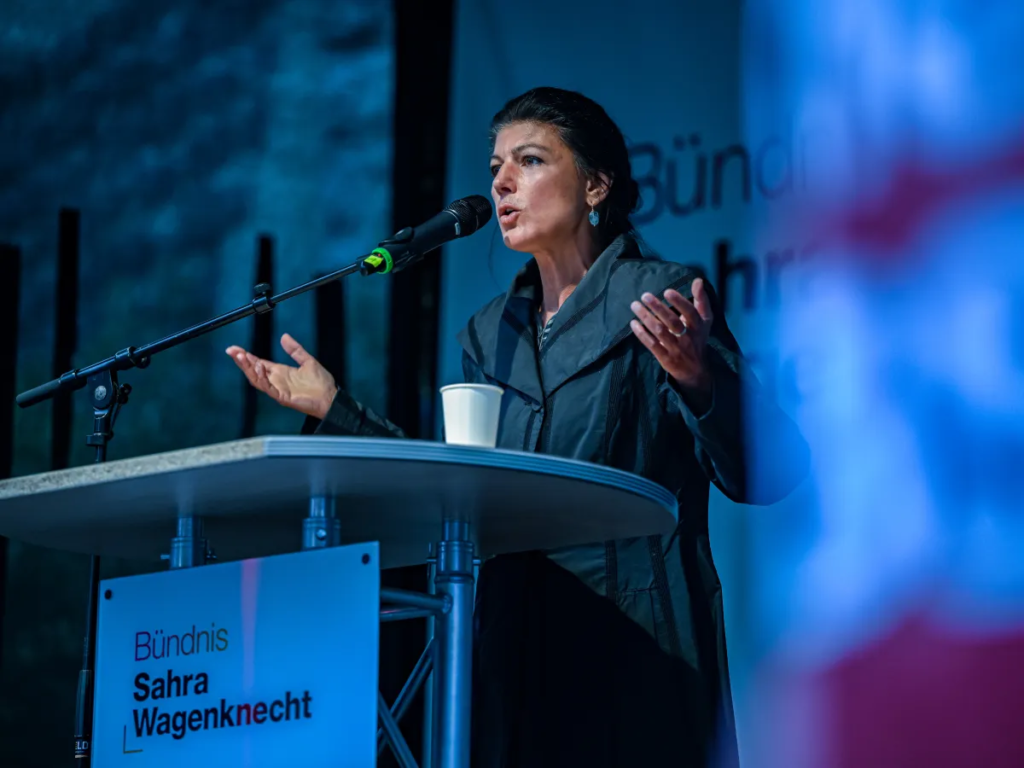Introduction: Sahra Wagenknecht
As Germany gears up for its state election in Brandenburg on September 22, 2024, Sahra Wagenknecht has emerged as a pivotal figure in the political landscape. Although Wagenknecht is not on the ballot, her influence is unmistakable, with her face prominently displayed on billboards throughout Brandenburg. Her newly-formed party, the Sahra Wagenknecht Alliance (BSW), is building on recent successes in Thuringia and Saxony, where it gained substantial traction and is now a significant force in state politics. This article delves into Wagenknecht’s rise, her controversial positions, and the broader implications for German politics.

The Rise of Sahra Wagenknecht: A New Political Phenomenon
Sahra Wagenknecht’s political journey has seen a remarkable transformation from a prominent figure within Germany’s Die Linke party to the leader of the Sahra Wagenknecht Alliance (BSW). Wagenknecht’s departure from Die Linke and the formation of BSW marked a significant shift in her political stance, blending elements of leftist ideology with a conservatism that defies traditional political classifications.
Her party’s recent successes have been notable. In the September 2024 elections in Thuringia and Saxony, the BSW secured a significant share of the vote, establishing itself as a crucial player in coalition negotiations. This success has been mirrored in Brandenburg, where the BSW’s growing influence could potentially reshape the political landscape, especially given the rising prominence of the far-right Alternative für Deutschland (AfD) party.
Wagenknecht’s Controversial Stance on Key Issues
Sahra Wagenknecht’s campaign has stirred considerable debate, particularly regarding her views on migration and foreign policy. During a recent rally in Brandenburg an der Havel, Wagenknecht criticized the German government’s decision to cut off Russian gas supplies, attributing the country’s escalating cost of living to this policy. She has advocated for a diplomatic resolution to the Russia-Ukraine conflict, suggesting that Vladimir Putin’s actions are comparable to those of the United States.
These positions have elicited mixed reactions. Supporters view Wagenknecht as a necessary counterbalance to the current government’s policies, while critics argue that her stance reflects dangerous anti-Western and anti-NATO sentiments. Historian Ilko-Sascha Kowalczuk has described the BSW and AfD as akin to “siblings in spirit,” both embracing populist rhetoric that rejects Western democratic values.
The Appeal of Wagenknecht’s Platform
Despite the controversy, Wagenknecht’s platform resonates with many voters. Her emphasis on stricter immigration controls and increased deportations addresses concerns about integration and public services. Manfred Köhler, a local steelworker, expressed frustration with the current state of public services and highlighted his support for new political entities, even if they are untested.
Wagenknecht’s approach has been designed to appeal to disaffected voters across the political spectrum. By focusing on issues like migration and public services, she aims to attract support from those dissatisfied with the traditional parties while maintaining a degree of separation from the far-right.
Recent Developments and Implications
The upcoming Brandenburg election is poised to be a significant test for Sahra Wagenknecht and her BSW. As polling data shows the AfD leading, the BSW’s role in shaping the outcome of the election will be closely watched. The results could have far-reaching implications for German politics, particularly in terms of coalition dynamics and the potential for shifting political alliances.
Timeline of Key Events
- March 2023: Sahra Wagenknecht participates in the “Let Women Speak” rally in Berlin, marking the beginning of her more prominent public political push.
- September 2023: The BSW performs strongly in state elections in Thuringia and Saxony, securing a significant share of the vote and becoming a key player in coalition discussions.
- January 2024: The BSW continues to gain momentum, with Wagenknecht’s policies on migration and foreign affairs becoming central to her campaign.
- September 2024: Brandenburg state election approaches, with Wagenknecht’s billboards and campaign activities intensifying as voters prepare to head to the polls.
Expert Opinions
- Ilko-Sascha Kowalczuk: Historian and author Kowalczuk has criticized the BSW and AfD for rejecting Western democratic values, describing them as “siblings in spirit” that embrace populist rhetoric.
- Cas Mudde: Political scientist Mudde views Wagenknecht’s platform as part of a broader trend in European politics where traditional left-right distinctions are increasingly blurred.
Conclusion: Navigating Germany’s Political Landscape
Sahra Wagenknecht’s ascension in German politics represents a significant shift in the political landscape. Her blend of left conservatism and controversial positions on migration and foreign policy has made her a key figure in the upcoming Brandenburg election. As voters head to the polls, the outcome will reveal whether Wagenknecht’s brand of politics can effectively challenge the status quo or further polarize the electorate.
External Sources:
- Süddeutsche Zeitung – For insights into historical context and contemporary analysis.
- Bild – For recent updates on Wagenknecht’s campaign activities and public reception.
- Der Spiegel – For expert opinions and political analysis on the current election dynamics.
For Regular News and Updates Follow – Sentinel eGazette
FAQs:
- What is the Sahra Wagenknecht Alliance (BSW)?
- The Sahra Wagenknecht Alliance (BSW) is a political party led by Sahra Wagenknecht, focusing on a mix of leftist and conservative policies. It aims to address issues such as migration and public services while challenging traditional party politics.
- Why is Sahra Wagenknecht a controversial figure in German politics?
- Sahra Wagenknecht is controversial due to her outspoken views on migration, her critique of Western foreign policies, and her Russia-friendly stance. Her positions have sparked debates about her alignment with anti-Western sentiments.
- What impact did the BSW have in the Thuringia and Saxony elections?
- In the Thuringia and Saxony elections, the BSW performed significantly well, securing a strong vote share and becoming a key player in coalition negotiations, influencing local political dynamics.
- How does Sahra Wagenknecht’s foreign policy stance differ from mainstream German politics?
- What are the potential implications of Wagenknecht’s policies for Germany?
- Wagenknecht’s policies could lead to shifts in Germany’s approach to migration, foreign policy, and coalition politics, potentially impacting the country’s alignment with European and international standards.